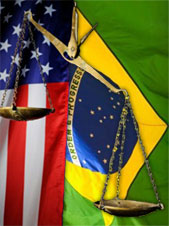Extradition Pursuant to Brazilian Law
Claus Nogueira Aragão*
 1. Extradition entails the surrender of an accused individual residing in Brazil to the executive authority of another nation for trial or actual compliance with a penalty that has been handed down. This is a legal institution that is set out in the 1988 Brazilian Constitution, as regulated by Law No. 6.815/80 (click here).
1. Extradition entails the surrender of an accused individual residing in Brazil to the executive authority of another nation for trial or actual compliance with a penalty that has been handed down. This is a legal institution that is set out in the 1988 Brazilian Constitution, as regulated by Law No. 6.815/80 (click here).
2. Although extradition involves the Executive Branch (executive authority), the Judicial Branches in both nations will necessarily become involved. In Brazil, extradition is processed at the Federal Supreme Court, which will hand down the initial ruling as to the legality and viability of the intended extradition.
3. For approval of a request for extradition, this request must be based on a treaty signed by and between the petitioning nation and Brazil or, should there be no such treaty, on a commitment as to future reciprocity.
4. Brazil is currently signatory to treaties with (i) Mercosul nations (Argentina, Uruguay and Paraguay), including Bolivia and Chile, which have joined the treaty; (ii) Australia; (iii) Belgium; (iv) South Korea; (v) Ecuador; (vi) Spain; (vii) the United States of America; (viii) France; (ix) Italy; (x) Lithuania; (xi) Mexico; (xii) Peru; (xiii) Portugal; (xiv) the United Kingdom; (xv) Russia; (xvi) Switzerland; (xvii) the Ukraine; and (xviii) Venezuela.
5. In order to grant extradition, it is necessary that:
(i) the person being extradited is not a native Brazilian, or, if naturalized as a Brazilian, that the crime predated the acquisition of the Brazilian nationality or that the crime involved illegal trafficking in drugs;
(ii) the crime is common to both countries and set forth by legislation in both the country claiming criminal jurisdiction and the fugitive’s country of residence, and has a penalty in excess of one year of confinement. The Federal Constitution expressly prohibits extradition for political crimes or crimes entailing personal opinions;
(iii) the crime on which the petition is based has not tolled in accordance with the statute of limitations legislation of either nation in question;
(iv) Brazil has no jurisdiction to judge the crime imputed to the party being extradited;
(v) the individual being extradited is not liable to any second-instance or appeals court; and
(vi) the individual being extradited is not answering for a proceeding whereby he/she has already been found against or absolved in Brazil based on the same event(s) on which the extradition petition is based.
6. Furthermore, once extradition has been actually granted, the petitioner nation undertakes to (i) hear and judge the individual being extradited in exact accordance with the petition as presented; (ii) commute any death penalty into a penalty involving incarceration; (iii) not surrender the extraditee to another nation without the prior acquiescence of Brazil; and (iv) comply with any detraction that might be required.
7. Judgment for a crime or compliance with a penalty for reasons other than those underlying the petition is only admissible with preliminary consent from Brazil to this effect, via a petition for extension of extradition, which will likewise be handled by the Brazilian Federal Supreme Court.
8. The request for extradition is submitted via diplomatic channels to the Brazilian Ministry of Foreign Affairs, which then refers it to the Ministry of Justice, which in turn sends the petition for the scrutiny of the Federal Supreme Court, where the case is distributed to a reporting justice, who will then refer the extradition petition for hearing by the Plenary Session.
9. Normally, extradition proceedings start with a decree ordering imprisonment of the fugitive in question. More recently, however, and despite the provisions of article 84 of Law No. 6.815/80, the Federal Supreme Court has been holding that any such request for imprisonment for purposes of extradition is also subject to the guidelines set out in article 312 of the Brazilian Code of Penal Procedure1, given that liberty is one of the fundamental rights of a human being.
10. And the Brazilian Supreme Court now takes this stance due to the fact that some extradition proceedings, in light of their essential complexity, require a time frame to proceed to judgment that is disproportional to the actual crime perpetrated. Therefore, Brazil currently allows extradition proceedings to go forward without the fugitive’s being held by the Federal Police.
11. Please bear in mind that the defense of the fugitive will only concern the identity of the person in question, defects of form as to the documentation submitted or the illegality of the petition. Brazil will not look into the merits of the criminal suit underlying the petition, as any such discussion should take place before the judiciary authorities of jurisdiction.
12. Once extradition has been granted, the petitioner nation is notified through diplomatic channels to arrange at its expense for the exit of the fugitive being extradited from the Brazilian territory. If, however, the petition is denied, the fugitive will be placed at liberty, if imprisoned, and no further petition based on these same events will be admissible under Brazilian law.
13. If the fugitive has been imprisoned in Brazil, his/her surrender may be conditioned to serving out this prison sentence. However, and at the discretion of the President of the Republic, the fugitive can be forthwith expelled from Brazil and turned over to the petitioner nation seeking such extradition.
14. Should the fugitive be absolved or satisfy the terms of the penalty in the nation seeking extradition, he/she may return to Brazil, provided that the surrender by Brazil did not also entail expulsion from the Brazilian territory.
15. The above summarizes the main points essential for understanding of extradition proceedings in Brazil.
____________
1Art. 312. Preventive imprisonment can be decreed in order to ensure public policy, economic policy, at the convenience of the criminal ruling or to ensure application of the penal law, where there is proof as to the existence of the crime and sufficient indications as to authorship thereof.
_________

*Senior attorney at Gonçalves, Arruda, Brasil & Serra - Sociedade de Advogados Law Firm in Brasília.

________________